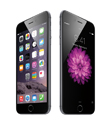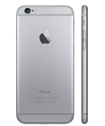Apple has always been notorious for doing things their own way, right from building their own operating system to the distinctive styling of their phones. This is the company's first attempt at building a large phone, and although they are not breaking any new ground, it's a big deal for them. It feels as if they are trying to match up to the market requirements rather than innovating.
Look, Design, Feel (/10)

At first look, both iPhone 6 and 6 Plus don’t look and feel designed by Apple. With the 4.7-inch iPhone 6 and the 5.5-inch iPhone 6 Plus, the company has laid emphasis on complete redesign and a much larger screen size than any of its predecessor.
The magnanimous iPhone 6 Plus features soft and rounded sides, unlike Apple’s iPhone 5 series which sported a stark, industrial feel. Apart from the glass screen, the entire frame is made from premium aluminium, similar to the one used in Apple MacBooks. The main ideology behind the design is to round off the edges and corners and seamlessly blend the glass into the edges to give a subtle but smoother appearance.
Even if you’re used to larger phones, the iPhone 6 Plus is a massive block for one-handed use. But the 7.1mm thickness is main benefit because larger iPhones cuddle comfortably as you wrap your fingers around it.
Features (/10)

The iPhone 6 Plus uses a 5.5-inch IPS Retina HD display with a screen resolution of 1,920 x 1,080. The text and images are sharp, with no serrated lines whatsoever. Additionally, the colour representation is less saturated than the Super AMOLED panel, and looks fantastic from a few inches away. Apple has mentioned of dual-domain pixels, which provides for wider viewing angles and it does live up to expectations.
The front panel of the phone is dominated mostly by the glass panel leaving very little space for the side bezel. The design also incorporates the 'swipe at the edge' to go back gesture which now feels much better than the previous iPhones. The Home button is at the bottom of the display, encircled by a metallic ring to assist in the Touch ID fingerprint recognition feature. Above the display, you’ll find the FaceTime front camera and the proximity sensor neighbouring the earpiece.
This is the first time Apple has integrated the Power/Screen lock button at the right edge instead of the top edge. The button is not exactly in the middle, making it difficult to reach and operate. The mute switch and volume control buttons are on the left edge. All the buttons are made of metal and sport a great tactile feedback.
The bottom edge of the phone features the 3.5mm headset jack, a microphone and speaker outlet along with the lightning connector port. The top does not have any buttons/ports or slots.
The back of the phone houses the slightly protruding 8MP iSight camera lens, TrueTone flash and a secondary microphone sitting next to it. The Apple + iPhone branding is also seen on the back of the phone.
Apple iPhone 6 Plus comes with iOS 8 that comes with the same software features available to its predecessors. Barring the landscape mode and reachability, there have been no software tweaks to allow user to experiment with the extra screen space.
The Reachability features allow users to bring the entire UI to the middle of the screen, so that all the apps can be accessed with one hand. The mode can be called upon by double tapping the Home button. iOS 8 has introduced a number of third party app widgets such as the Health app, SwiftKey, Swype for easy typing and communication.
Connectivity (/10)
The Apple iPhone 6 Plus comes with a mobile payment service called Apple Pay that can be enabled using a wireless standard known as Near-Field Communications (NFC). Apart from mobile payments, NFC can do a lot more like locking hotel rooms, pair Bluetooth devices, Foursquare check-ins and much more. But the iPhone 6 Plus’s NFC will be limited just to Apple Pay. It also offers 802.11ac WiFi and Bluetooth connectivity options, in addition to 4G LTE.
Performance (/10)
This year, Apple is claiming that its A8 chipset comes with a 25 percent improvement in CPU performance and 50 percent in GPU output. To put it simple in layman’s terms, the phone incorporates a 1.4GHz dual-core chipset with 1GB RAM, which doesn’t sound good when compared with quad-core Snapdragon or octa-core MediaTek handsets. Yet, games load and run smoothly on the iPhone and multitasking works really well.
Fitted with a 2,915mAh Li-Po battery, the iPhone 6 Plus provides an impressive performance making it through a full day of heavy use; constant web surfing, video streaming and GPS navigation.
Value for Money (/10)
The iPhone 6 Plus is not for everybody. The size of the phone can turn out to be its highlight or drawback, especially for those who are deciding between iPhone 6 Plus and iPhone 6. Along with the superior battery and amazing camera, the large screen justifies the premium price stated for the phablet. The iPhone 6 Plus 6 Plus is neither the best on the scene nor groundbreaking. But it has entered the hotly contested large screen phone market where it should have been ages go. For a die-hard Apple fan, every iPhone is a very good device in its own right.
Pros
- Large, gorgeous display
- Amazing camera with optical image stabilization
- Extensive battery life
- Swift performance
Cons
- One-handed use is exasperating
- No micro-SD card slot
- No user-replaceable battery
- NFC limited to Apple Pay
- Pricey phone
